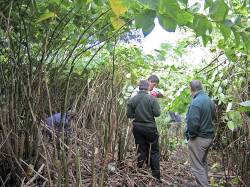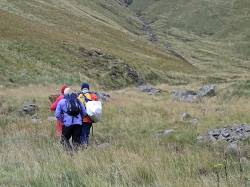Summary
Why do people volunteer to get involved in woodland conservation?
Summary

British Trust for Conservation Volunteers in Glasgow
Carrifran Wildwood volunteers (with the Borders Forest Trust) set off for their day’s activity near Moffat
This project investigated why people get involved in practical volunteering work, what benefits they gain and whether there are barriers to getting or staying involved. Forest Research collected quantitative data on the emotional state and personal well-being of volunteers, along with qualitative data from interviews with volunteers and representatives of national and local organisations involved in volunteer recruitment and development.
Key findings and recommendations
The research team developed a conceptual framework based on the motivations and benefits of environmental volunteering:
- Everyone wins: benefits to the individual, local community, wider society, environment and organisations that manage and develop volunteers
- Holistic perspective: volunteers talked about a ‘package’ of benefits, rather than emphasising some benefits over others
- Motivations: volunteers are not just concerned about the environment, but seek personal benefits from the outdoor opportunities and social nature of environmental activities – learning new skills, meeting others, improving their health, well-being and quality of life
- Something for everyone: environmental volunteering offers a range of opportunities to suit people with diverse interests and abilities
- Common language: the environment provides a common language for all and a shared purpose independent of gender, ethnic background, age, physical ability, mental functioning, socioeconomic status or knowledge of environmental management
- Barriers to starting: transport to sites, lack of confidence, low awareness of local volunteering opportunities
- Barriers to continuing: feeling excluded from an existing group, lack of feedback on work, activities not matching volunteer’s skills
Recommendations
- Taster sessions: introduce opportunities to people unfamiliar with environmental volunteering to develop a more diverse range of volunteers
- Partnerships: work with volunteer centres to promote volunteering opportunities and help the centres recruit more participants
- Local authority engagement: local authorities must report their performance against a national indicator for citizen participation in regular volunteering
- Local community engagement: many local groups would welcome the chance for their members to participate in a day’s volunteering activity, helping people who would normally lack confidence to get involved
- Research: study how people’s motivations for volunteering change over time to help organisations develop volunteers and meet their needs to stay interested and involved
- Behaviour change: find out whether environmental volunteering changes people’s attitudes towards the environment and if this leads to pro-environmental behaviour
Publications
Funders and partners
Funded by the Scottish Forestry Trust and the Forestry Commission.
Research carried out by Deakin University and Forest Research.
Contact
Status
Completed 2008.
General Content
Related pages
- Volunteering in forests in Scotland and Wales
- People, trees and woodlands
- Trees and woods for well-being and quality of life
- Forestry, sustainable behaviours and behaviour change
- Societal benefits of trees, woods and forests
